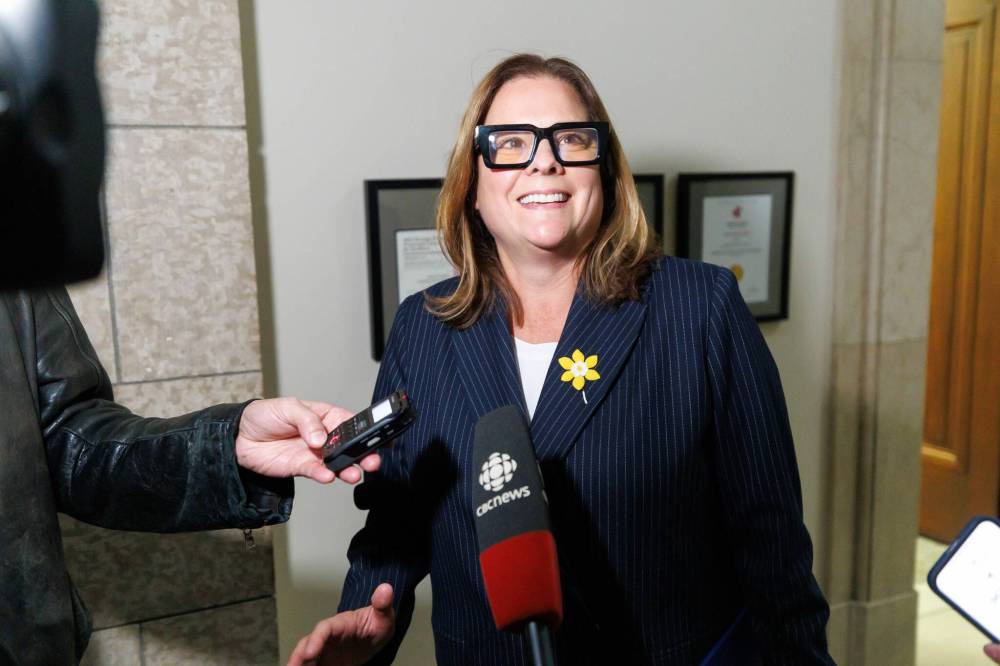Why strong ethical guardrails are important
Advertisement
Read this article for free:
or
Already have an account? Log in here »
To continue reading, please subscribe:
Monthly Digital Subscription
$0 for the first 4 weeks*
- Enjoy unlimited reading on winnipegfreepress.com
- Read the E-Edition, our digital replica newspaper
- Access News Break, our award-winning app
- Play interactive puzzles
*No charge for 4 weeks then price increases to the regular rate of $19.00 plus GST every four weeks. Offer available to new and qualified returning subscribers only. Cancel any time.
Monthly Digital Subscription
$4.75/week*
- Enjoy unlimited reading on winnipegfreepress.com
- Read the E-Edition, our digital replica newspaper
- Access News Break, our award-winning app
- Play interactive puzzles
*Billed as $19 plus GST every four weeks. Cancel any time.
To continue reading, please subscribe:
Add Free Press access to your Brandon Sun subscription for only an additional
$1 for the first 4 weeks*
*Your next subscription payment will increase by $1.00 and you will be charged $16.99 plus GST for four weeks. After four weeks, your payment will increase to $23.99 plus GST every four weeks.
Read unlimited articles for free today:
or
Already have an account? Log in here »
Hey there, time traveller!
This article was published 23/05/2025 (209 days ago), so information in it may no longer be current.
It’s been a long time coming.
A year, seven months and eight days, to be precise.
But the province’s ethics commissioner, Jeffrey Schnoor, has delivered his report on the last gasp of the former PC administration’s power — an attempt to grant a major mining permit after the Tories had already been defeated at the polls.

MIKE DEAL / FREE PRESS FILES
Former premier Heather Stefanson
After the NDP had been elected, but before they were sworn in as government, a group of PC politicians tried to do an end-run around established process and push through approval of the controversial Sio Silica sand-mining project.
By convention, defeated governments refrain from making major decisions between the time of an election call and the time a new government is sworn in — in simple terms, the acting administration can no longer claim it has the backing of the will of the people, particularly once it has been defeated.
During that time, called the caretaker convention, a defeated government is only supposed to make routine decisions, particularly avoiding acting on major issues in a way that would tie the hands of an incoming government
That’s not how it went.
Two former PC cabinet ministers — Kevin Klein and Rochelle Squires — confirmed that they had been contacted by fellow cabinet member Jeff Wharton and told that the outgoing premier wanted them to approve a contentious Sio Silica permit to mine sand using unproven technology.
To their credit, both Klein and Squires refused to sign off on the project.
If the position of ethics commissioner didn’t exist, or if it lacked significant investigative authority, that would have been the end of the story.
Those who wanted to believe Klein and Squires would have believed something rotten took place, and those who chose to imagine that Klein and Squires were just offering up sour grapes after their defeats would have believed that as well.
Wharton chose to muddy the waters further, arguing that Klein and Squires had broken cabinet confidentiality by any talk of pressure being exerted on them.
This is a golden example of why there have to be independent officers of the legislature, and why their offices have to have teeth — enough to compel politicians to explain their actions under oath, and enough to provide meaningful, complete analysis of what took place. Oh, and enough power to be able to recommend meaningful punishment.
The investigation is remarkable for a number of reasons, not the least its conclusions. A careful read of its 100 pages shows a welter of conflicting testimony about how and when things happened, a bevy of memory loss by critical political players (including the former premier), and public servants determined to halt improper actions by their political masters. What the politicians involved admitted to was bad enough — the gaps in their memories and the conflicting statements, including attempts by some to cast themselves in the best possible light, are remarkable.
None of which would ever have come to light in the absence of a strong and independent ethics commissioner. None of which would have come to light without the ability to compel testimony under oath, and the ability to pursue a complete investigation of the circumstances.
The ethics commissioner has recommended three of the politicians involved be fined: former premier Heather Stefanson is facing an $18,000 fine, former minister of finance Cliff Cullen, a $12,000 fine, and former minister of economic development, investment and trade Jeff Wharton, a $10,000 fine.
The irony in all of this is that the commissioner’s powers are new: they spring from legislation brought in by the Brian Pallister administration in May of 2021, but which didn’t come into force until Oct. 4, 2023 — mere days before the improper behaviour began.
Checks and balances exist for a reason. We’ve just seen what that reason is.





